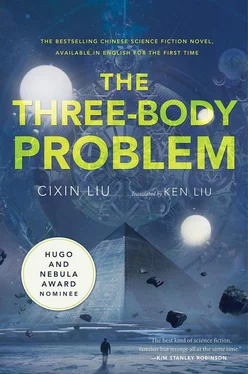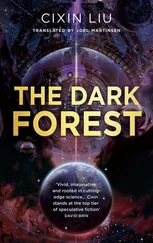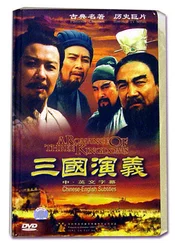Shi pulled a document halfway out of the envelope in front of him and shoved it back in again, suddenly losing interest. “You’re right. Even a fish can be used to commit a crime. I handled a murder case once. Some bitch cut off her husband’s family jewels. You know what she used? A frozen tilapia she got out of the freezer! The spines along the back were like razors—”
“I’m not interested. Did you ask me to the meeting just to talk about this?”
“Fish? Nanomaterials? No, no, nothing to do with those.” Shi put his mouth next to Wang’s ear. “Don’t be nice to them. They’re prejudiced against us. All they want is to get information out of us, but never tell us anything. Look at me. I’ve been here for a month, and I still don’t know anything, just like you.”
“Comrades,” General Chang said, “let’s get started. Of all the combat zones around the globe, this one has become the focal point. We need to update the current situation for all the attending comrades.”
The unusual term “combat zone” gave Wang pause. He also noticed that the general did not seem to want to explain in detail the background of what they were dealing with to new people like him. This supported Shi’s point. Also, in General Chang’s short opening remarks, he used the word “comrades” twice. Wang looked at the NATO and CIA officers sitting across from him. The general had neglected to add “gentlemen.”
“They’re also comrades. Anyway, that’s how everyone addresses each other here,” Shi whispered to Wang, pointing at the four foreigners with his cigarette.
While he was baffled by how Shi knew what he was thinking, Wang was impressed with his powers of observation.
“Da Shi, put out your cigarette. There’s enough smoke here,” General Chang said as he flipped through some documents. He called Shi Qiang by a nickname, “Big Shi.”
Shi looked around but couldn’t find an ashtray. In the end, he dropped the cigarette into a teacup. He raised his hand, and before Chang could even acknowledge him, he spoke loudly. “General, I have a request which I’ve made before: I want information parity.”
General Chang lifted his head. “There’s never been a military operation in which there was information parity. I have to apologize to all the scholars, but we cannot give you any more background.”
“We are not the same as the eggheads,” Shi said. “The police have been part of the Battle Command Center from the start. But even now, we still don’t know what this is all about. You continue to push the police out. You learn from us what you need about our techniques, and then you send us away one by one.”
Several other police officers in attendance whispered to Shi to shut up. It surprised Wang that Shi dared to speak in this manner to a man of Chang’s rank. But Chang’s response surprised him even more.
“Da Shi, it seems that you still have the same problem you had back when you were in the army. You think you can speak for the police? Because of your poor record, you had already been suspended for several months, and you were about to be expelled from the force. I asked for you because I value your experience in city policing. You should treasure this opportunity.”
Shi continued to speak roughly. “So I’m working in the hope of redeeming myself by good service? I thought you told me that all my techniques were dishonest and crooked.”
“But useful.” Chang nodded at Shi. “All we care about is if they’re useful. In a time of war, we can’t afford to be too scrupulous.”
“We can’t be too fastidious,” a CIA officer said, in perfect Modern Standard Mandarin. “We can no longer rely on conventional thinking.”
The British colonel apparently also understood Chinese. He nodded. “To be, or not to be…” he added in English. “It’s a matter of life and death.”
“What is he saying?” Shi asked Wang.
“Nothing,” Wang replied mechanically. The people before him seemed to be speaking out of a dream. Time of war? Where is this war? He twisted to look out one of the floor-length windows. Through the window he could see Beijing in the distance: Under the spring sun, cars filled the streets like a dense river; on a lawn someone was walking a dog; a few children were playing….
Which is more real? The world inside or outside these walls?
General Chang said, “Recently, the enemy has intensified the pattern of attacks. The targets remain elite scientists. Please begin by taking a look at the list of names in the document.”
Wang took out the first page of the document, printed in large font. The list seemed to have been generated in a hurry, containing both Chinese and English names.
“Professor Wang, as you look through these names, does anything strike you?” General Chang asked.
“I know three of the names. All of them are famous scholars working at the forefront of physics research.” Wang was a little distracted. His eyes locked onto the last name on the list. In his mind, the two characters took on a different tint than the names above it. How can her name appear here? What happened to her?
“You know her?” Shi pointed to the name with a thick finger, stained yellow from smoking. Wang did not reply. “Ha. Don’t know her. But want to know her?”
Now Wang Miao understood why it made sense for General Chang to have asked to have this man who was once a soldier under his command. Shi, who appeared so vulgar and careless, had eyes as sharp as knives. Maybe he wasn’t a good cop, but he was certainly a fearsome one.
* * *
A year earlier, Wang Miao had been in charge of the nanoscale components for the “Sinotron II” high-energy particle accelerator project. One afternoon, during a brief break at the Liangxiang construction site, Wang was struck by the scene before him. As a landscape photography enthusiast, Wang often saw the sights around him as artistic compositions.
The main component of the composition was the solenoid of the superconducting magnet they were still installing. About three stories high and only half completed, the magnet loomed like a monster made of giant blocks of metal and a confusing mess of cryogenic coolant pipes. Like a junk heap from the Industrial Revolution, the structure exuded inhuman technological grimness and steel-bound barbarity.
In front of this metal monster stood the slim figure of a young woman. The composition’s lighting was fantastic as well: The metal monster was buried in the shadow of a temporary construction shelter, further emphasizing its stern, rough quality. But a single ray of light from the westering sun coming through the central hole in the shelter fell right on the woman. The soft glow lit up her supple hair and highlighted her white neck above the collar of her overalls, as though a single flower was blooming in a metal ruin after a violent thunderstorm….
“What are you looking at? Get back to work!”
Wang was shocked out of his reverie, but then realized that the director of the Nanotechnology Research Center wasn’t talking to him, but to a young engineer who had also been staring at the woman. Having returned from art to reality, Wang saw that the young woman wasn’t an ordinary worker—the chief engineer stood next to her, explaining something respectfully.
“Who is she?” Wang asked the director.
“You should know her,” the director said, waving his hand around in a large circle. “The first experiment on this twenty-billion-yuan accelerator will probably be to test her superstring model. Now, seniority matters in theoretical physics, and normally, she wouldn’t have been senior enough to get the first shot. But those older academics didn’t dare to show up first, afraid that they might fail and lose face, so that’s why she got the chance.”
Читать дальше












